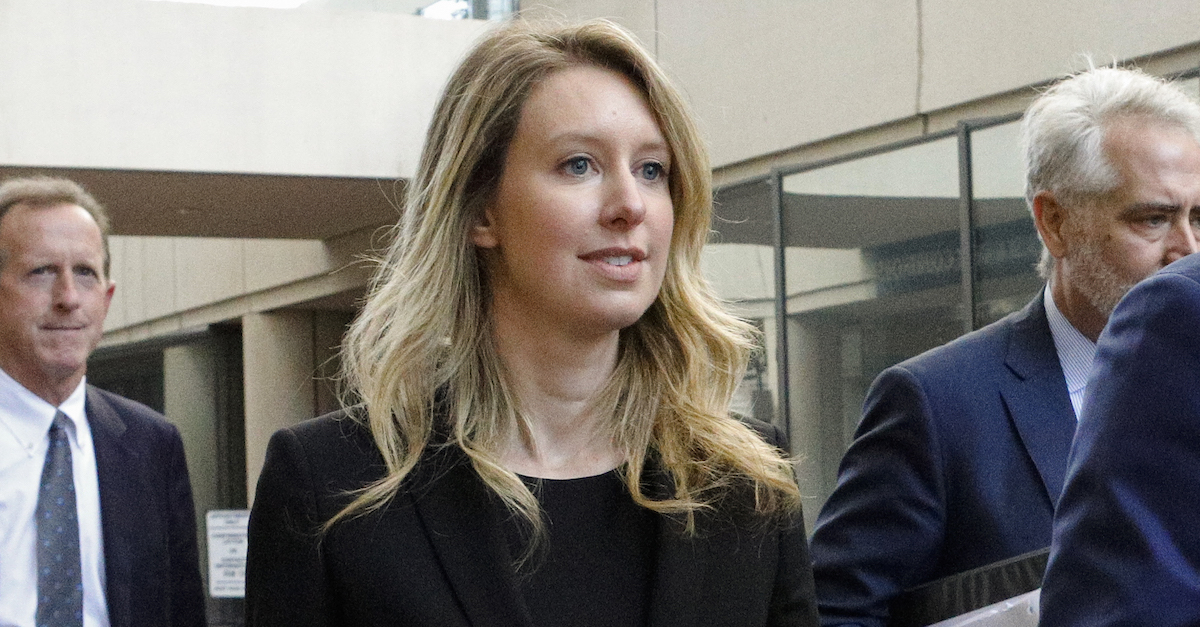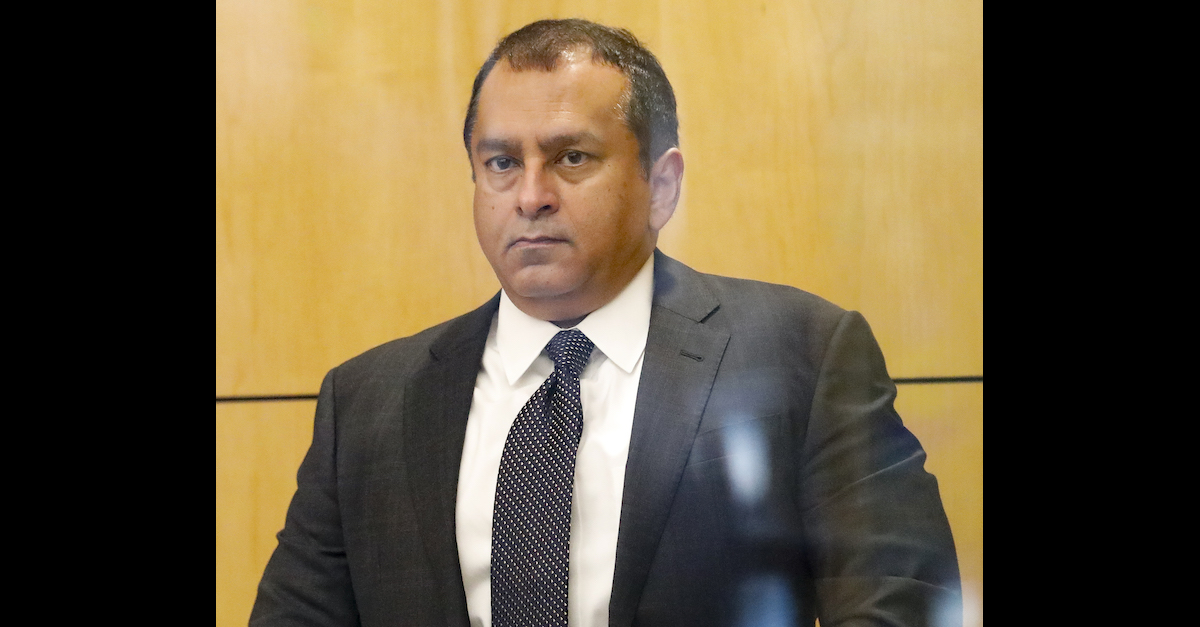
Former Theranos CEO Elizabeth Holmes leaves federal court with her legal team after a status hearing on July 17, 2019 in San Jose, Calif. (Photo by Kimberly White/Getty Images)
Court documents revealed publicly for the first time Saturday indicate that Theranos CEO Elizabeth Holmes will “likely” accuse her former boyfriend and co-executive Ramesh “Sunny” Balwani of “intimate partner abuse” as Holmes faces trial on federal fraud charges.
Holmes and Balwani were indicted together in June 2018 on a total of eleven total counts of wire fraud and conspiracy to commit wire fraud.
“[E]vidence about intimate partner abuse is highly likely to be introduced into evidence in a trial involving Ms. Holmes, in the form of both fact and expert testimony,” her defense team indicated.
The defense explains its legal tactic in a lengthy paragraph in a Feb. 6th motion that was just unsealed:
The government has alleged in the Superseding Indictment that Ms. Holmes acted with mens rea in making certain representations, but it has not identified the specific evidence upon which it will rely to prove this element. Based on Ms. Holmes’ current (but limited) understanding of the government’s case — as informed by the government’s broad (yet vague) Indictment — there is a high likelihood that evidence regarding the nature of Ms. Holmes’ and Mr. Balwani’s relationship will be relevant at trial. The Indictment charges both defendants with the same conspiracies and acts. Ms. Holmes was the company’s CEO and Chair and Mr. Balwani its Vice Chair, COO, and President during the period covered by the alleged conspiracies. The government presumably will argue that Ms. Holmes was aware of, approved of, turned a blind eye to, and/or directed alleged wrongdoing related to aspects of the company’s operations over which Mr. Balwani exercised control. The Indictment alleges that Ms. Holmes made categories of misstatements related to company operations for which Mr. Balwani had primary responsibility. For example, the government presumably will argue that Ms. Holmes was aware of alleged falsity of statements related to Theranos’ financial models, even if Mr. Balwani created and presented those models to investors. Ms. Holmes’ relationship with Mr. Balwani at a time when she was suffering intimate partner abuse, and the reasons why she believed representations about those financial models, are relevant to the question whether she knew that such models were false or misleading. The government presumably will argue that Ms. Holmes was aware of the alleged falsity of statements related to the state of the Walgreens partnership. Mr. Balwani was primarily leading that partnership. Ms. Holmes’ relationship with Mr. Balwani, and the reasons why she believed representations that she transmitted about that partnership, are relevant to the question whether she believed that any statements about the Walgreens relationship were false or misleading, including to rebut any claim that she was “deliberately ignorant” of certain alleged facts.
The defense argued that “excluding or limiting” evidence of “intimate partner abuse” would constitutionally cripple Holmes’ ability to mount a defense. They said a “detailed understanding of the nature of the relationship both in and out of the workplace” between Balwani and Holmes was necessary for the jury to decide whether or not Holmes was in the proper mental state to have committed the crimes charged. In other words, because of the alleged control and the alleged abuse, Holmes did not form the “intent to deceive,” according to the defense:
Witnesses interviewed by the government have indicated that Mr. Balwani was controlling with Ms. Holmes, that Ms. Holmes was isolated by Mr. Balwani, that Mr. Balwani was combative with Ms. Holmes, and that Mr. Balwani was often physically present in Ms. Holmes’ office, all factors that Dr. Mechanic [an expert witness] has indicated are abuse tactics used by abusers.
The defense then said expert testimony would likely be forthcoming to allege “how Ms. Holmes’ psychological responses during and after the relationship were and are consistent with typical reactions of victims of an abusive relationship.” And the defense said it was poised to dispel theories that Holmes “presented in public as a successful businesswoman” and therefore could not be suffering as an “abuse victim” — a stereotype the defense accused the government of incorrectly perpetuating.
The defense also said Holmes was “likely to testify herself to the reasons why she believed, relied on, and deferred to Mr. Balwani.”

Former Theranos COO Ramesh Balwani appears in federal court for a status hearing on July 17, 2019 in San Jose, Calif. (Photo by Kimberly White/Getty Images)
The defense motion generally characterizes Holmes as a CEO who deferred considerably to (or felt threatened into complying with) the plans or demands of her corporate number two — Balwani — on matters connected to the alleged crimes.
“[S]he believed that [his] various representations were true,” the defense argued in one passage; therefore, Holmes did not “knowingly” commit fraud — which is something the government must prove beyond a reasonable doubt.
The defense motion is dated and was filed on Feb. 6th, but it was initially sealed. It was only revealed publicly on Saturday after the Dow Jones Co. intervened in the case to force some of the record to be made public.
An earlier Holmes defense document dated Jan. 10th lodged similar accusations against Balwani. It argued that the proceedings against the duo should be severed due to the effects Balwani’s presence would have on Holmes’ demeanor in front of a jury should the two be tried together:
Mr. Balwani exercised psychological, emotional and [redacted] control over Ms. Holmes.
[ . . . ]
Ms. Holmes may suffer a range of serious physical, psychological, and emotional effects, many of which would visibly affect Ms. Holmes’ demeanor in the courtroom and hinder her ability to participate in the trial proceedings or communicate with counsel. Ms. Holmes’ potentially debilitating PTSD symptoms would materially prejudice her ability to exercise fundamental trial rights, including her right to testify on her behalf, during the proceedings. They would also affect Ms. Holmes’ demeanor in a way likely to compromise the jury’s ability to reliably assess her guilt or innocence based on the evidence adduced at trial.
Significant portions of that document which likely divulge the specific alleged facts of the Holmes/Balwani relationship remain blacked out. So do significant portions of an attached declaration by the aforementioned Dr. Mindy B. Mechanic, a defense expert.
Balwani reciprocated by asking to sever his case from the Holmes prosecution. He argued that the Holmes allegations would seriously prejudice him in front of a jury.
Prosecutors objected to the dual severance requests. They suggested that accusations of abuse would likely be excluded from evidence. Holmes’ attorneys immediately cried foul and said the allegations were a critical part of Holmes’ defense.
A Feb. 24th motion by Balwani’s legal team called the Holmes accusations “salacious and inflammatory.” It indicated that Holmes was directly accusing her ex of “sexual abuse” — among other misdeeds:
Ms. Holmes plans to introduce evidence that Mr. Balwani verbally disparaged her and withdrew “affection if she displeased him”; controlled what she ate, how she dressed, how much money she could spend, who she could interact with — essentially dominating her and erasing her capacity to make decisions.
[ . . . ]
[She] alleg[es] that Mr. Balwani’s control included monitoring her calls, text messages, and emails; physical violence, such as throwing hard, sharp objects at her; restricting her sleep; monitoring her movements; and insisting that any success she achieved was because of him[]. In short, even setting aside the claims of sexual abuse, Ms. Holmes alleges a decade-long campaign of psychological abuse contemporaneous with the events in the indictment — evidence of which would never be admissible against Mr. Balwani were he tried alone.
“In truth, Ms. Holmes’ allegations are deeply offensive to Mr. Balwani, devastating personally to him, and highly and unfairly prejudicial to his defense of this case,” Balwani’s defense motion continued.
In a March 30th order to sever the Balwani and Holmes cases, a judge noted “Mr. Balwani adamantly denies these allegations” from Holmes.
The Holmes trial is scheduled to begin on Sept. 7th and to conclude in mid-December. Balwani’s case is scheduled for trial in 2022, CNN reported.
Read the documents below: